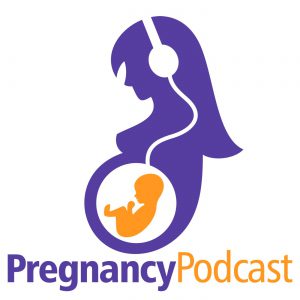

The Podcast
I make no apologies for returning to this podcast again and again.
If you are looking for short, easy to digest episodes on everything about pregnancy, birth and the postpartum, this one’s for you.
The host, Vanessa Merten, does all the research so you don’t have to and then shares her findings in a fun, straightforward and non-judgemental way.
I dare you not to love it!

The episode
Your due date, or guess date as I and many other doulas tend to refer to it, is one of the first things you find out after getting that positive test result.
It’s also one of the first things everyone asks you.
On top of that, all of your prenatal appointments and any tests or procedures are scheduled around it.
Perhaps most importantly, discussions of interventions like induction or cesarean will start to take place the closer you get to your guess date.
It’s easy to start to think that your baby will, or should, make their appearance on that date.

That question
The question that everyone asks is –
”When are you due?”
When you are first pregnant it’s an easy one to answer and probably something you enjoy talking about.
However, I love that Vanessa underlines that, the closer you get to the date in question, the less you may feel like talking about it.
I’m just going to jump in here and add a little doula idea. When people ask when you are due, consider giving a vague answer, for instance, early October, October or even just, the autumn.

If you want to be more specific, lie.
What??!
Yep. Add two weeks. So, if your guess date is October 1st, you could say that it’s October 15th.
This may feel like a strange thing to do at the beginning but once you get close to your guess date and for sure if you go past it (which you likely will), you’ll be glad not to have twenty messages a day asking –
”Have you had the baby yet?”

Know your terms
It used to be the case that a pregnancy was considered full term at 37 weeks. Now, however, it is known that those last few weeks of pregnancy are super important for your baby’s development.
The National Child and Maternal Health Education Program specifies four terms.
Early Term: 37 weeks – 38 weeks 6 days
Full Term: 39 weeks – 40 weeks 6 days (your due date is 40 weeks)
Late-Term: 41 weeks – 41 weeks 6 days
Post-Term: 42 weeks onwards

What happens if I go past my guess date?
This will depend on quite a few factors including your country’s birth culture, how your care provider feels about your going past your guess date, where you plan to birth your baby and how you feel about it.
Not many care providers will be comfortable with you going beyond 42 weeks due to an increased risk of stillbirth.
However, it is important to keep in mind that all of the term definitions above assume that your due date is accurate.

How long does an average pregnancy last?
Vanessa cites a couple of studies that suggest it is most accurate to calculate a due date by adding 282 or 283 days to the last menstrual period. Interestingly, many due dates are calculated by adding just 280 days.
Vanessa found that most estimates suggest that only between 3% and 5% of babies are born on their actual due date.
CDC (Centers for Disease Control and Prevention) data from 2018 suggests that the percentage of babies born at each term are as follows-
Pre Term: 10.02%
Early Term: 26.5%
Full Term: 57.2%
Late & Postterm: 6.2%
Keep in mind that the high cesarean rate in the USA will have some effect on these numbers, as will cases of induction.

Modern science
You might be surprised to learn that the way your due date is calculated stems from way back in the 1700s. Even more surprisingly, it may have been influenced by the length of pregnancies mentioned in the bible – 10 lunar months or 280 days.
The formula was first used by German Obstetrician, Franz Karl Naegele, in the late 1700s. It is still referred to today as Naegele’s Rule.

Ok, ready?
You take the first day of your last period, add 7 days and then go forward 9 months.
It’s worth noting that Naegele’s Rule is based on a 28-day mentrual cycle so if yours is shorter or longer, adjustments should be made.
Oh, and unless you are actively tracking your cycles, how many people will remember exactly when their last period started?
One study suggests about 56%
It also assumes that ovulation takes place on day 14 and that conception took place on that day too.
However, sperm can survive for up to 7 days before fertilising an egg and the time between ovulation and implantation can be as much as 11 days.
You can see why many doulas refer to your due date as your guess date!

Ultrasounds
Ultrasounds are another way that an EDD (estimated due date – note the word estimated) is calculated.
Depending on how far along your pregnancy is, various measurements will be taken to calculate your EDD.
The measurement that gives the most accurate EDD is how long your baby is from crown to rump.
The accuracy level here is 3 to 8 days.
Ultrasound or Naegele’s Rule?
After looking at various studies, Vanessa states that ultrasound fairly early on in pregnancy is the most accurate way to calculate the EDD.

More than one due date?
Vanessa cites a super interesting study that suggests a more evidence-based way of estimating when a baby might be born could be to have a range of due dates or to describe the due date as a median (by date X this percentage of people would have given birth).
The study also put forward the idea of looking at the length of the pregnant person’s previous pregnancies as a frame of reference.

Key takeaways
There was so much information provided in this episode that this post could have been about three times as long. I think we can all agree that that would have been a bit much!
I hope this has given you some food for thought and I love that Vanessa leaves us with a few things to focus on.
1. If you are planning to get pregnant, track your cycles and when you have sex.
2. If you are pregnant and have no idea when your last period was, don’t stress. Your guess date will still be useful for planning but keep in mind that it is a ballpark date and not an exact one.
3. Remember that your EDD is an estimate. If you go past it, your baby is not late. There are a whole lot of factors that will determine when you go into labour.
4. Raise any questions or concerns about your guess date with your care provider and have an open conversation, sooner rather than later.

To wrap up
Vanessa goes into a lot more detail during the episode, especially in reference to the difference between ultrasound dating and estimating a due date based on the last menstrual period.
I really recommend that you listen to the episode in full for a solid understanding of how your due date, something so central to your pregnancy and birth, is actually estimated.
Something I love about this podcast is that Vanessa always links to the studies she cites in the show notes. So, if you want to explore these studies for yourself, simply click on the episode link at the top of this page.
Until next time!
Emily Wills is a doula based in Stockholm. She believes that birth can be a beautiful and empowering experience and started this blog as a way of sharing some really great podcasts. She is also a mother of three and an enthusiastic runner.
